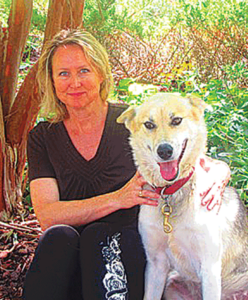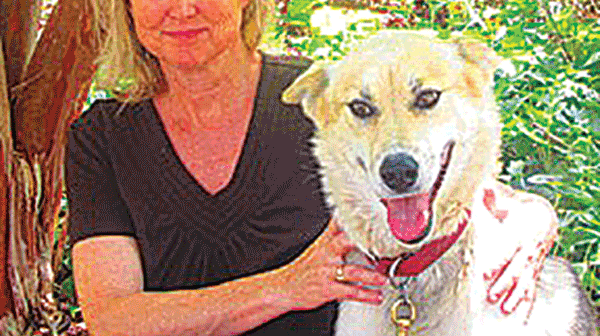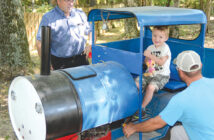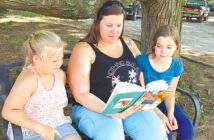
Andrea Sisson’s Alaskan husky, Donner, doesn’t look a day over five years old, despite having been born in 2008.
Few would guess they were in the presence of a senior dog when they see Donner dancing on the end of her leash. Even fewer would realize they’re in the presence of a TV star. Donner isn’t just any Alaskan husky. She worked as one of the mushing dogs on the TV show, “Life Below Zero.” Celebrity runs in her family. Donner’s father, Iceberg, is the lead dog on that TV program. Her mother, Agata, is well-known in the world of mushers – being a Canadian dog who has produced pups for the Yukon Quest, a 1,000-mile sled dog race similar to the famed Iditarod.
Donner’s career on the popular TV series and as a musher ended when she suffered an injury to her back leg. Usually, dogs mush across ice only if it’s covered in snow, which provides traction for them. However, in the winter of 2014, an emergency arose that required Donner and her team to cross “glare ice”– ice devoid of snow cover and therefore treacherously smooth and slippery. Donner slipped, and the injury she sustained proved so severe that it prevented her from ever mushing again.
So how did this former sled dog TV star turn into a household pet in Chester?
Sisson and her son, Nick, arrived at Donner’s home, a homestead in the Alaskan bush, in the summer of 2015. The goal was to make sure Nick enjoyed “a wilderness experience. I was tired of fighting the video game battle with him, and wanted to see him spending his time free of this influence. In the bush, there’s no Wi-Fi,” Sisson said.
Both animal lovers, the pair volunteered to take care of the sled dogs on the homestead. When Donner would go through the morning routine of sitting for a fish, “she’d always just sit there, wagging her tail and looking at us, she wouldn’t take the fish. All the other dogs took the fish right away, but she would just sit there, wagging,” Sisson said. Eventually, she and Nick learned Donner wanted affection first–and then she would eat her fish. “That was the first thing that made her stand out. I realized this dog was really smart.”
But there was something else that made Donner special: her work ethic. Donner’s owner told Sisson that Donner “would howl and cry in the winter when her team left for work each day and she had to stay behind. Her work ethic was so strong that not being able to work was torture for her.” During the summer days, “I ended up letting her off her chain, and she stayed with me the majority of the time that first summer. Out of the 18 or so dogs, I immediately was drawn to her. She followed me everywhere – sat next to me while I worked in the garden.”
Not long before arriving in the bush, Sisson and her son had unexpectedly lost their dog, Fly. “Nick was devastated. Fly was like his sibling.” They weren’t looking for a new dog, but with her injury, Donner’s prospects were bleak. “People there don’t view their dogs as pets. They’re working dogs,” Sisson explained. “When they can’t work anymore, they’re often put down or turned into breeding dogs.” Until Sisson and Nick came along, those two futures were Donner’s only options. Fortunately, her owner picked up on the bond Sisson and Donner were forming. “We agreed to split the cost to get her back to Virginia,” Sisson said. In essence, Donner and Sisson saved each other. “She didn’t replace Fly, but as we bonded, I realized what an amazing animal she is.”
Donner has not only helped Sisson heal from the loss of Fly, but has also inspired the reading specialist to write a children’s story. “She’s such a phenomenal dog. I’d love to share her with children.” Sisson’s work in progress tells the tale of a little girl about to lose her sled dog because he can no longer work, much the same way Donner almost fell to the fate of euthanasia or breeding after sustaining her career-ending injury.
Perhaps surprisingly, Donner’s transition from Alaskan bush life to suburban life in Virginia has been smooth. “It’s been an easy adjustment,” Sisson said. While one might expect an Alaskan husky to suffer in the South’s summer heat, Sisson explained that in the bush in the summer “the sun doesn’t set, so it gets fairly warm and doesn’t really cool down much.
Weather-wise, the summer months can be just as hot as in Virginia. The only difference would be the lack of humidity.
The pair does face challenges, though, one of which “is walking her on a leash. She gets very excited and begins to pull me. She is convinced that this is what she is supposed to do, so I usually walk her only a short distance. It’s easier to take her somewhere she can run free for exercise.”
Donner is also terrified of Sisson’s cat. “She had never seen a cat before–only bobcats. She remains completely intimidated by any cat.” She is also afraid of cows. “I think she thinks they’re bears,” Sisson said.
Despite these amusing misconceptions–products of Donner’s former life in a very different world–Sisson is beyond pleased to have added Donner to her family. She may be afraid of cats and cows, but “I dare to say she is the smartest dog I’ve ever owned.”




